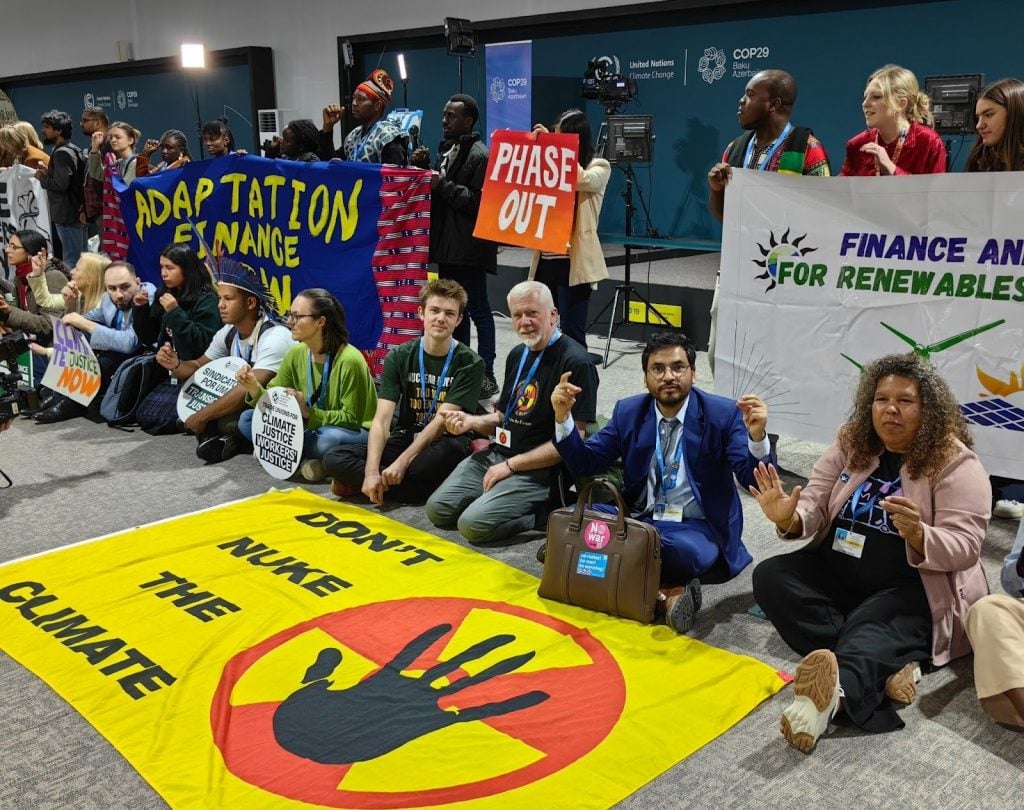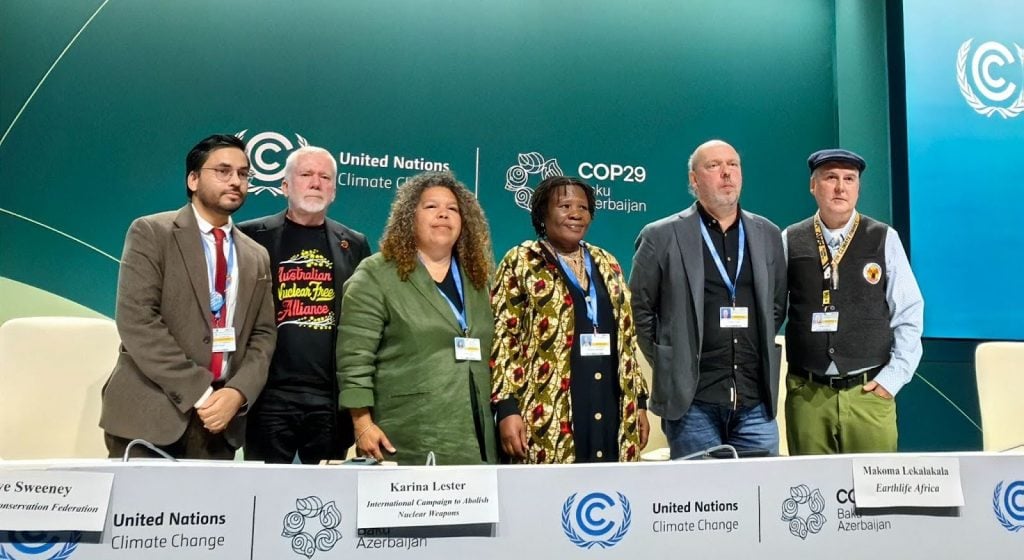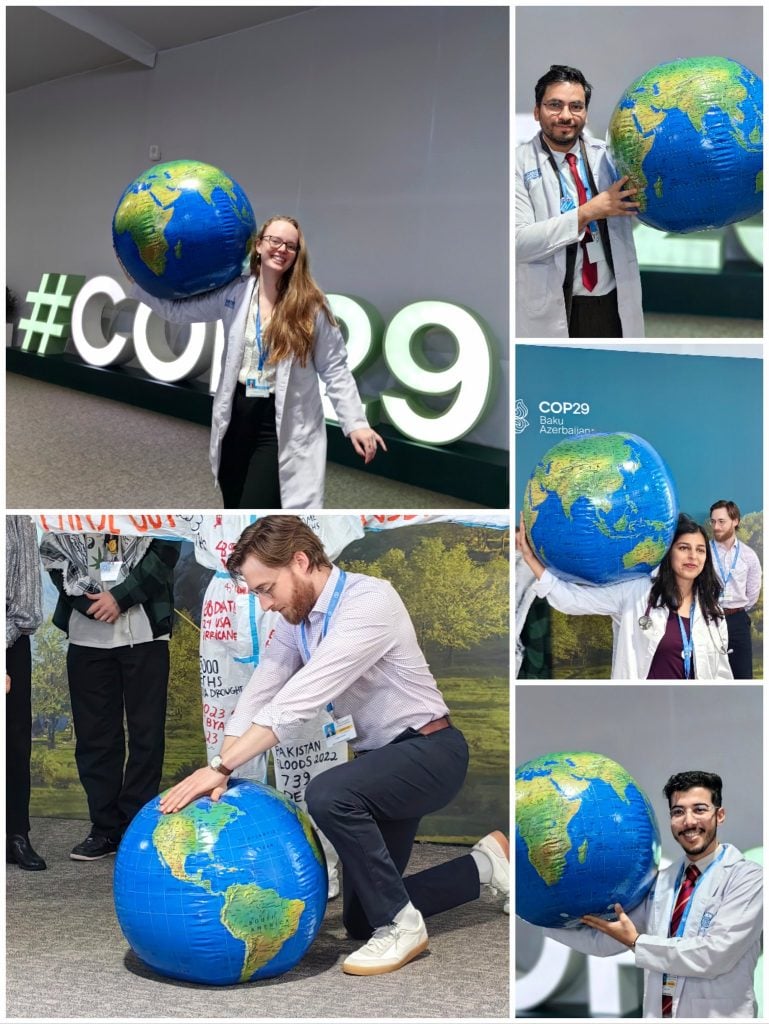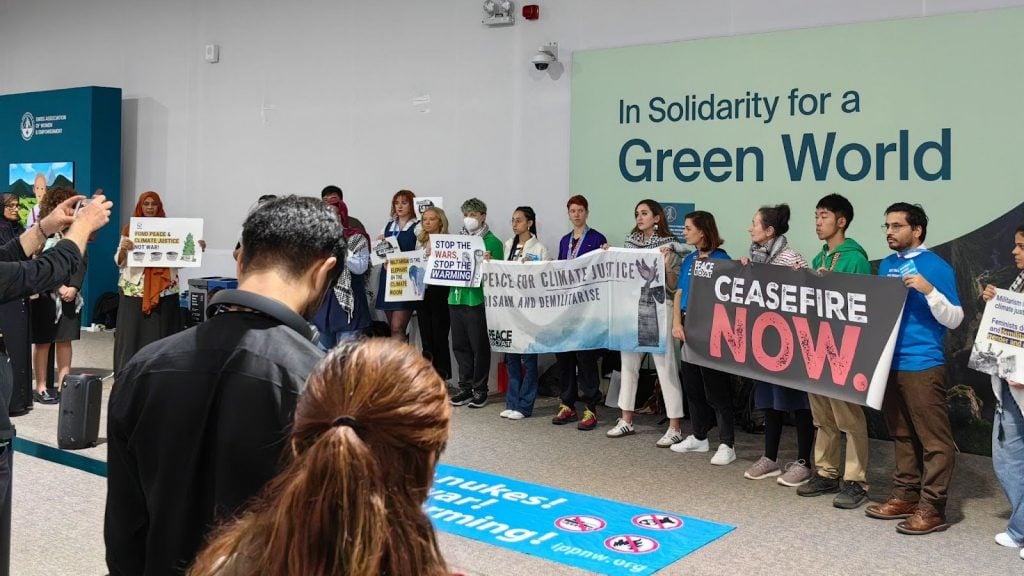For the 29th UN climate conference (COP29) in Baku, Azerbaijan, International Physicians for the Prevention of Nuclear War (IPPNW) and Medact sent official delegations to highlight human and environmental health. The IPPNW team emphasized that the climate crisis, militarisation, and nuclear weapons pose a severe threat to global health, stressed that the climate crisis exacerbates conflict and inequality, and called for addressing fossil-fuel dependence and militarisation through peace action, press conference and advocacy at COP29.
COP29, which took place from November 11th to 22nd 2024, assembled representatives from 197 countries, the European Union, G7, G20, NGOs, youth, and activist organisations, seeing a significant turnout, with over 70,000 registered and virtual delegates. It focused on key climate issues like finance for developing countries and implementing the Paris Agreement. But it faced several notable failures, including the inadequate climate finance pledge of $300 billion annually by 2035, flawed carbon trading rules, and the failure to address the link between militarization and the climate crisis. Additionally, it did not reinforce commitments to transition away from fossil fuels, leaving significant gaps in tackling the climate emergency, with some developing nations feeling the outcomes fell short. However, the conference extended a gender-focused program and emphasised the importance of integrating health considerations into climate policies, highlighting the health benefits of reducing emissions and addressing climate-related health risks.

As an emergency medicine doctor myself, I highlighted our foremost goal being prevention and stopping the escalation of the climate crisis as vital for our survival. We held a press conference, in collaboration with our partner “Don’t Nuke the Climate”, focused on global justice and human rights to health by investing in renewable energy, not by perpetuating the false solution of nuclear power. I had three main points during the press conference:

1. Health hazards linked to nuclear power: Nuclear energy is not a viable solution and may hinder necessary progress. Despite some advocating for increased nuclear power at this COP summit in the name of climate action, I highlighted the health hazards linked to nuclear power. Moreover, as a representative of an organisation dedicated to preventing nuclear war, I emphasised that nuclear power fuels the development of nuclear weapons. Long-term prevention must include phasing out nuclear power.
Nuclear accidents are a notable health risk. For example, the Fukushima incident saw a significant rise in thyroid cancer cases, similar to the Chernobyl disaster, which caused 20,000 thyroid cancer cases. It’s important to note that nuclear power poses significant health risks even during normal operations across the production chain. As physicians, we know that the frequently cited claim by nuclear power advocates—that ionizing radiation is harmless below a certain level—is scientifically inaccurate.
2. Global injustice: Nuclear power is rooted in global injustice. The entire nuclear chain, from uranium mining to the unresolved issue of nuclear waste, poses significant health risks, impacting vulnerable communities.
3. Prevention: Every nuclear facility, whether it involves mining, enrichment, fuel fabrication, or operating nuclear power plants, poses a proliferation risk and can be a critical step toward developing nuclear weapons. It’s crucial to take these risks seriously. If a nuclear bomb were to be used, we would be unable to mitigate the aftermath. Humanity faces two existential threats: climate change and nuclear weapons. Therefore, immediate action is essential: abolish nuclear power and nuclear weapons.
Despite this, the International Atomic Energy Agency (IAEA) and Nuclear power lobbyists were playing a significant role at COP29 focusing on how to use nuclear energy, with discussions on tripling global nuclear power capacity by 2050 to promote false solutions to climate targets—rather than committing to increasing renewable energy capacity, reducing greenhouse gas emissions and expanding wind, solar, hydropower and green hydrogen sectors. There was also rampant disinformation from lobbyists about eating a banana being far more radioactive than living near a Nuclear power plant for a year.

It is therefore high time to remain vigilant and ensure that climate policies are driven by science and the need for urgent action, rather than nuclear and fossil fuel industry interests, potentially diluting the urgency of real climate action.
Overall, for the second time, IPPNW was at COP29 to advocate for the urgent connection between human and environmental health. We highlighted the health hazards of nuclear power and the need for renewable energy investments, as well as the existential threats of climate change and nuclear weapons. Throughout the two-week event we called for disarmament and demilitarisation to finance climate action.

Medact is the UK affiliate of International Physicians for the Prevention of Nuclear War (IPPNW).